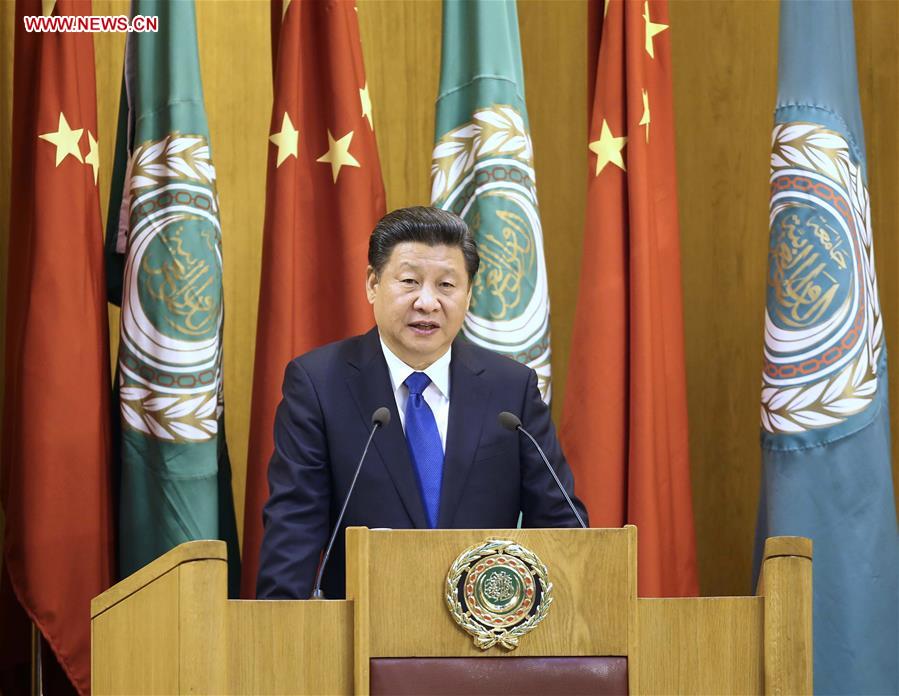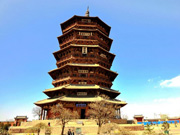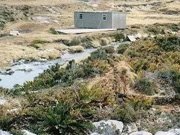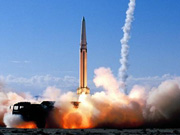

 |
| Chinese President Xi Jinping delivers a speech at the Arab League headquarters in Cairo, Egypt, Jan. 21, 2016. (Xinhua/Pang Xinglei) |
Observers said concrete aide measures proposed in President Xi Jinping's latest Middle East policy speech are "pragmatic and effective" in addressing the region's thirst for stability and economic re-invigoration.
When addressing the Arab League at its headquarters in Cairo on Thursday afternoon, Xi stressed the need to "advance industrialization in the Middle East" and carry out production capacity cooperation.
"China's competitive production capacity and the human resources in the Middle East, when combined, will deliver more and better job opportunities for the region," Xi, who is on a three-nation trip to the Middle East, said.
Xi announced that China will set up a $15 billion special loan for industrialization in the region to be used on production capacity cooperation and infrastructure projects in regional countries.
China will launch a $20 billion joint investment fund with the UAE and Qatar to primarily invest in traditional energy, infrastructure development and high-end manufacturing industries in the region, Xi said.
China and the Middle East "need to make good use of the coming five years", the crucial period to jointly build the Belt and Road Initiative, Xi said.
Li Guofu, a researcher of Middle East studies at the China Institute of International Studies, said Xi had set the target of realizing the measures proposed in the upcoming five years "in order to make sure benefits are delivered faster to people of both China and the Middle East".
Xi's speech displayed China's latest philosophy that will help address regional hotspot issues, and has reaffirmed China's commitment to not interfering in domestic affairs of regional countries, Li said.
Wang Yiwei, director of the Institute of International Affairs at Renmin University of China, said: "China's successful experience in the process of modernizing itself has greatly inspired and encouraged the Arab countries to explore their own developing pathways that adapt to their respective national conditions."
On steps to promote stability in the region, Xi said China will "set up a China-Arab research center on reform and development".
To boost structural adjustment, Xi said China may sign more currency swap and mutual investment agreements, expand RMB settlement services and accelerate investment facilitation.
Both China and the Middle East will steer the investment fund and private capital of the two parties toward major projects under the Belt and Road Initiative, he said.
Li Shaoxian, a senior expert in Middle East studies at Ningxia University in Yinchuan, the Ningxia Hui autonomous region, said: "Political stability and economic re-invigoration - the two key elements for ensuring regional stability are inseparable from each other".
Taking Egypt as an example, Li said huge endeavors have been made to resume its domestic stability, "but problems may return if its economy does not recover quickly".
He Wenping, a senior expert on Middle East studies at the Chinese Academy of Social Sciences, observed that the Middle East - standing at the intersection of Europe, Asia and Africa - enjoys a profoundly strategic location and "it is undergoing a critical phase as it rolls out political restructuring and social transformation".
"China has not been absent from Middle East affairs, it has been increasingly proactive when conducting peaceful diplomacy with the region in recent years … and co-building the Belt and Road Initiative may be a part of the peaceful diplomacy," He said.
Day|Week

 Beautiful Chinese tennis player Wang Qiang goes viral online
Beautiful Chinese tennis player Wang Qiang goes viral online Chinese pole dancing master opens class in Tianjin
Chinese pole dancing master opens class in Tianjin The most beautiful town of snow in China
The most beautiful town of snow in China SWAT members hold romantic wedding in E China
SWAT members hold romantic wedding in E China Breathtaking scenery and simple lifestyle in Hainan
Breathtaking scenery and simple lifestyle in Hainan Finding sexiest underwear supermodels
Finding sexiest underwear supermodels Top 10 ancient pagodas in China
Top 10 ancient pagodas in China Chinese version of Victoria's Secret Show held in Hunan
Chinese version of Victoria's Secret Show held in Hunan Can you find out the sniper hiding in camouflage?
Can you find out the sniper hiding in camouflage? Spectacular rockets launch scenes
Spectacular rockets launch scenes